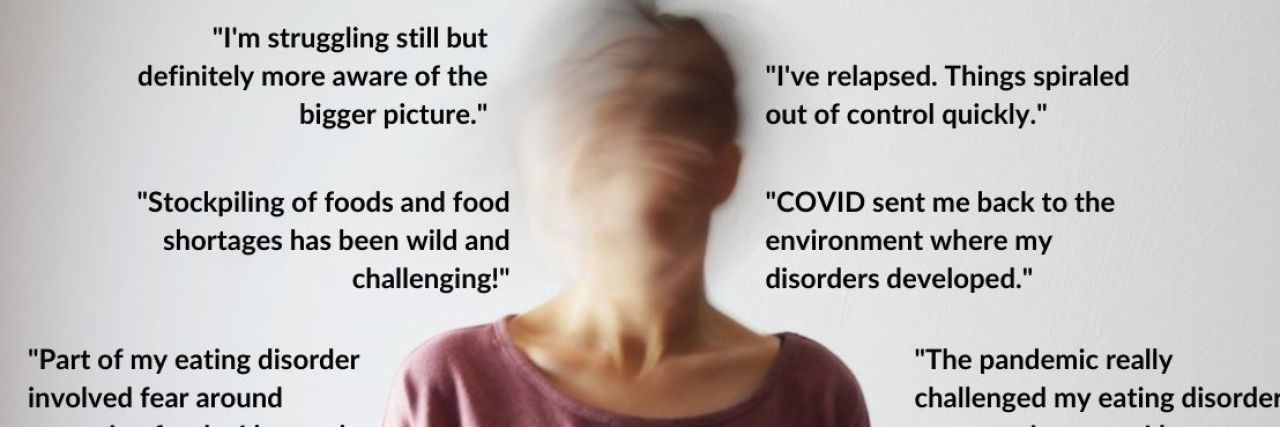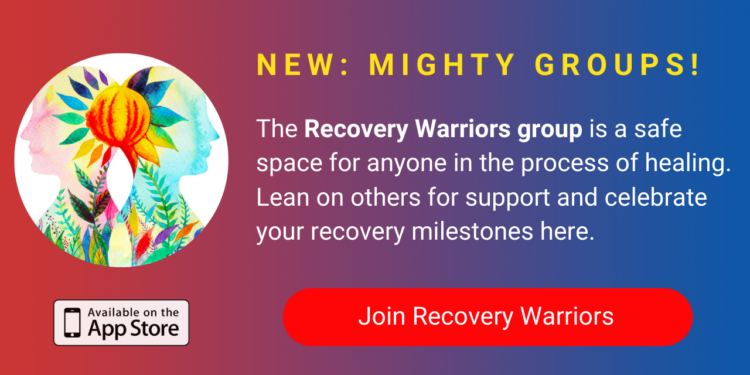Having experienced the COVID-19 pandemic for over 10 months by now, we’re all too familiar with the hidden consequences we didn’t immediately recognize at the start. For many, the isolation has manifested as depression and feelings of loneliness, much of which has been magnified by the holiday season.
For those who live with eating disorders, the pandemic has presented many obstacles that might not be immediately noticeable by others. There are many different kinds of disordered eating patterns — anorexia, bulimia, binge eating disorder, orthorexia, etc, and each of them is considered medically to be a mental illness — though in many cases the disorder can have physical consequences that can turn life-threatening.
The Mighty partnered with the National Eating Disorders Association (NEDA) to ask individuals with eating disorders how COVID-19 has impacted their experience. If you or someone you know is struggling with an eating disorder, please click this link to reach out to NEDA’s hotline.
“I felt like I had no control over anything — that’s where my eating disorder steps in. It’s my ‘go to’ for security.”
Many respondents said that the advent of the pandemic caused them to slide back into old patterns that sparked their eating disorder.
1. “COVID sent me back to the environment where my disorders developed and caused regression in mental progress made during recovery half a year prior. Though I did not experience a physical relapse, the mental effects of lockdown were damaging to my academics, relationships and self-image.” — Chloe B.
2. “Stockpiling of foods and food shortages has been wild and challenging!” — Rae K.
3. “I’ve relapsed. Things spiraled out of control quickly! The pandemic made me extremely anxious, too many changes happened in the world in such a short amount of time. I felt like I had no control over anything — that’s where my eating disorder steps in. It’s my ‘go to’ for security.”
4. “I actually developed the eating disorder because of the pandemic. All new territory for me. I declined pretty quickly but went in for treatment as soon as I could. I feel like I’m struggling still but definitely more aware of the bigger picture. I have the tools to help me through it.” — Erika C.-Q.
“Eating disorders thrive in isolation.”
Chelsea Kronengold, NEDA’s communications manager, answered a few questions as to why so many are experiencing setbacks in their recovery.
“Research studying the impact of COVID-19 on individuals with eating disorders confirms many of the challenges we are hearing from our community, including concern about a lack of structure, spending more time in a triggering environment, and trouble finding privacy for teletherapy and other forms of virtual support,” Kronengold said.
She said that other study outcomes showed that the symptoms of certain disorders like increased eating in both a restrictive and binging sense were magnified by the circumstances around COVID-19 and its lockdowns, as well as an increased risk of relapse.
“Eating disorders thrive in isolation,” Kronengold said. “So feeling physically isolated from friends, family, support groups and treatment professionals can put an extreme strain on people suffering from eating disorders.”
“I relapsed twice, but I’m still here TRYING.”
Some individuals said that while things have been extra challenging during this period, their experience with their disorder during the pandemic has allowed them to develop new hobbies, approach their healthcare in different ways and pursue the treatment that they need.
5. “The pandemic really challenged my eating disorder recovery journey…I have to want to want recovery. I tried new things, tried new recipes and even picked up new hobbies. The pandemic helped me realize I AM STRONG. I am worthy of recovery. I relapsed twice, but I’m still here TRYING. I’ve never struggled this much, but without the pandemic I wouldn’t have tried new things that I found out I love now.” — Kimmie B.
6. “The sudden change in routine and uncertainty that COVID has caused for everyone was especially challenging for someone like me who already experienced a heightened sense of anxiety around food… All of these fears flooding my mind was a huge sign for me to reach back out to my doctor. I have now been taking an anti-anxiety medication for six months and spoke to a therapist over the phone for four. The combination, along with a supportive family and circle of friends, allowed me to return to a healthy mindset.” — Sierra H.
7. “Part of my eating disorder involved fear around preparing food… I learned how to manage my fear of food insecurity that happened at the beginning when everyone was panic buying. I learned how to prepare foods that used to intimidate me, especially meat, and how to plan and prepare food for a household rather than just for myself… One of the most important tools I had was my relationship with my therapist and my dietitian, who ran an online support group for about nine months. Having weekly support was essential!” — Alex K.
8. “I’m a healthcare worker, and the start of the pandemic sent my anxiety to the worst point I’ve ever had in my life. With the amazing help of my wife, family and my treatment team I have been able to stay in recovery and have prevented relapsing. The curse was this year has been the worst year for urges to act on symptoms, but the blessing is that I’ve been able to stay strong and not act.” — Bethany O. E.
“A critical aspect of eating disorder recovery is finding connection and community, whatever that looks like.”
As many of the above testimonies have stated, a support system of family, friends and medical practitioners have facilitated at least some recovery during this difficult time.
Kronengold said that a critical aspect of eating disorder recovery is finding connection and community, whatever that looks like in an individual’s life.
“It’s also important that we practice self-compassion, as well as compassion for others, during this unprecedented time. Try your best to follow your meal plan as closely as possible and give yourself some grace when plans go awry,” she said.
NEDA also offers free and/or low-cost pandemic resources including their NEDA Connections video series, 10-20 minute check-ins, activities, opportunities to access presentations given by NEDA associates and leaders, and more. Find these resources here.
If you’re an individual who is struggling to the point where you think perhaps further rehabilitative care is necessary, please offer yourself compassion. It is more than OK to both ask for and need help, whatever that looks like for you.
“No two eating disorders are the same, so not every person will exhibit the same behaviors,” Kronengold said. “The earlier a person with an eating disorder or disordered eating seeks treatment, the greater the likelihood of physical and emotional recovery.”
NEDA offers a variety of tools that can help you determine if you need further professional care with its eating disorders screening tool for ages 13 and up, the toll-free and confidential hotline, and a list of things to look out for by way of symptoms and signs if things are getting out of hand for you.
Know that you are not alone and are surrounded by individuals all across the world who are sharing in your experience.
You are worthy of recovery and deserve above and beyond the care that you need.
Reach out to NEDA here for further guidance and help as we go through this collectively strange and challenging time together, yet separately.


